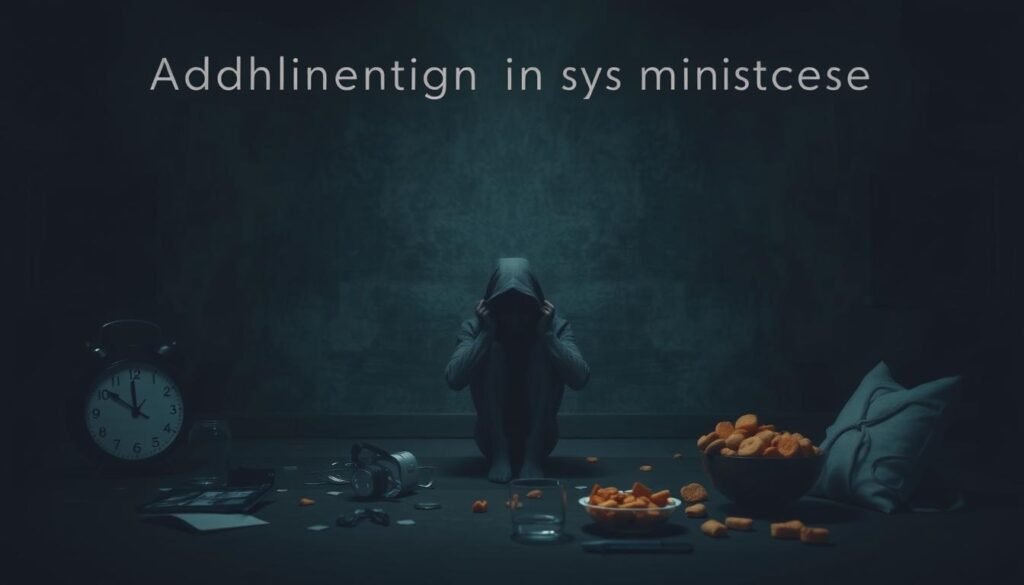Did you know nearly 30 million Americans have diabetes? Many suffer from extreme fatigue. This fatigue can dramatically affect their day-to-day life. It’s important to spot diabetic fatigue early on. This helps in managing diabetes better. In this article, we’ll explore the signs of diabetic fatigue, its causes, and how to boost energy for those affected.
Key Takeaways
- Diabetic fatigue impacts tons of people with diabetes, lowering life quality.
- Detecting the signs and symptoms early is key for improved diabetes control.
- Feeling very tired often happens, even with enough rest.
- Knowing how changing blood sugar levels affect energy is crucial.
- There are effective ways to deal with diabetic fatigue and boost well-being.
Understanding Diabetic Fatigue
Diabetic fatigue is a common problem. It shows up as constant tiredness in those living with diabetes. This feeling of exhaustion often comes from energy depletion due to changing blood sugar levels. When glucose levels are too high or too low, the body struggles to make energy. This leads to feeling tired and weak.
Checking blood sugar often is crucial for diabetics. It helps keep sugar levels steady. Both high and low blood sugars can make you feel tired. This creates a tough cycle that’s hard to break. Managing diabetes can also be emotionally hard, adding to the fatigue.
Knowing more about diabetic fatigue helps people manage their energy better. Spotting the signs early can improve your health. This lets individuals enjoy their daily activities more.
Recognizing the signs and symptoms of diabetic fatigue
It’s crucial to know the signs and symptoms of diabetic fatigue. If you feel constantly tired, unmotivated, and can’t focus, take notice. These feelings might seem stronger than usual if you have diabetes. This is often because changing blood sugar levels prevent your body from using glucose right. High blood sugar can make your energy drop and make you feel extremely tired.
Common Indicators of Fatigue
There are several signs that indicate diabetic fatigue. Spotting these signs early is key. Look out for:
- Persistent tiredness even after rest
- Increased difficulty in focusing on tasks
- Lack of enthusiasm for regular activities
- Unexplained physical exhaustion
Knowing these symptoms can help you decide to get medical help. For more on diabetic symptoms, visit this resource.
The Impact of Diabetes on Energy Levels
Diabetes really affects your energy. When not enough glucose gets into your cells, you’ll feel less energetic. This often means feeling tired all the time, which makes everyday tasks harder. Keeping an eye on your blood sugar is key to managing your energy. Understanding how blood sugar affects your energy can help control your diabetes symptoms.
| Indicator | Description |
|---|---|
| Persistent Tiredness | Feeling exhausted most of the time, no matter how much rest is obtained. |
| Lack of Motivation | Struggling to find energy for activities previously enjoyed. |
| Difficulty in Concentrating | Experiencing challenges in focusing and completing tasks due to fatigue. |
Causes of Diabetic Fatigue
Knowing why diabetic fatigue happens is key to handling energy better. Changes in blood sugar and side effects from medicines are major reasons for feeling tired. Understanding these can help people deal with their everyday and lessen that ongoing tiredness.
Blood Sugar Levels Fluctuations
Blood sugar highs and lows are a big reason for diabetic fatigue. These swings can make daily tasks hard. Also, high blood sugar over time can cause problems like infections and nerve damage, making fatigue worse. Checking blood sugar often can help spot trends that lead to tiredness, letting people adjust their plans.
Medication Side Effects
Medications can make people with diabetes feel very tired too. Drugs like corticosteroids and statins might cause this tiredness. Knowing how your treatment affects your energy is very important. Being informed about your medicines can help you and your doctor find better options to reduce fatigue.
Additional Symptoms of Diabetes
There are more signs of diabetes than just feeling tired. Knowing them helps with managing the disease.
Increased Thirst and Frequent Urination
Feeling very thirsty is a common sign. This happens because high sugar levels make kidneys work harder. This leads to needing the bathroom more often. This makes people drink more to stay hydrated.
Blurry Vision and Weight Loss
Blurry vision is also a symptom. Too much sugar can mess with the eye’s fluids, making it hard to see clearly. People might lose weight quickly, too. Without sugar for energy, the body uses fat instead. This causes noticeable weight loss.

| Symptom | Description |
|---|---|
| Increased Thirst | Constant feeling of thirst due to high blood sugar levels. |
| Frequent Urination | Frequent urge to urinate as the kidneys filter excess glucose. |
| Blurry Vision | Distorted or unclear vision due to fluid changes in the eye. |
| Weight Loss | Unintentional weight loss caused by the breakdown of fat for energy. |
The Relationship Between Diabetes and Chronic Fatigue
Diabetes and chronic fatigue are closely linked. Many with diabetes feel really tired all the time. This tiredness comes from their bodies trying hard to keep blood sugar levels right. Studies show that 23% to 42% of people with type 1 diabetes often feel very tired.
Mental health is key for those with diabetes. They might deal with diabetes distress, making them feel more tired. Also, they’re more likely to face depression, which makes managing fatigue tougher.
Being overweight makes managing diabetes harder. Many with type 2 diabetes are overweight. To help, diabetic people should exercise and sleep 7 to 9 hours a night.
Yoga and meditation can reduce stress and help with diabetes and fatigue. It’s good to see a doctor if changes don’t help, especially if you also feel sick or have a fever.
| Aspect | Details |
|---|---|
| Risk of Depression | Individuals with diabetes are 2-3 times more likely to suffer from depression. |
| Fatigue Prevalence | 23% to 42% of adults with type 1 diabetes report fatigue. |
| Sleep Impairments | 31% to 35% of adults with type 1 diabetes experience subjective sleep impairment. |
| Impact of Obesity | Obesity significantly impacts fatigue management and emotional health. |
| Effective Strategies | Regular exercise and stress-reducing activities aid in managing fatigue. |
Managing Diabetic Fatigue
It’s crucial to handle diabetic fatigue to feel better overall. Making lifestyle changes and sticking to diabetes care plans helps a lot. Changing what you eat and how much you move can boost your energy. This makes diabetic fatigue less of an issue.
Lifestyle Changes: Diet and Exercise
Eating right is key for beating diabetic fatigue. Focus on whole foods and cut down on processed sugars to keep your blood sugar stable. Studies show that magnesium and chromium can help your body use insulin better, giving you more energy. Exercise is just as important. It helps control your blood sugar and increases your energy. Find fun ways to stay active and make it a daily habit.
Effective Diabetes Management Strategies
Good diabetes management is essential for fighting fatigue. Regularly checking your blood sugar helps you spot and address changes quickly. It’s important to follow your medication plan, even if it makes you tired. Devices that monitor your glucose constantly can make managing your blood sugar easier. By sticking to these practices, you can take charge of your diabetes and improve your life.

When to Seek Medical Consultation
Knowing when to get medical advice is key for those managing diabetic fatigue. It’s important to recognize serious symptoms early. This can lead to better control of diabetes and improve your overall health. If any concerning symptoms show up, get help right away. This quick action might stop more severe health issues from developing.
Recognizing Severe Symptoms
Key symptoms that mean you should see a doctor include:
- Extreme tiredness
- Unusual weight loss
- Persistent dehydration
- Difficulty breathing
- Rapid heartbeat
- Extreme drowsiness or unconsciousness
Seeing these signs means you should act fast. Doing so may help you avoid emergency situations caused by diabetes.
The Importance of Regular Check-ups
Regular check-ups are very important for managing diabetes well. These visits let doctors check your blood sugar and update your care plan. Going to these appointments keeps you up-to-date about your health. It lets you make needed changes to how you live. Taking these steps helps lower the chance of problems from diabetic fatigue.
Long-Term Effects of Diabetic Fatigue
Diabetic fatigue can greatly impact someone’s life over time. It makes it hard to stay productive and maintain healthy relationships. This condition challenges people in many ways.
Impact on Daily Life
Fatigue can change everyday life a lot. It might make focusing at work or doing chores hard. This can lead to feeling frustrated.
Feeling tired all the time hurts personal relationships and happiness. Hobbies and seeing friends might not interest you anymore. This situation shows why it’s important to deal with fatigue early on.
Potential Complications If Left Unmanaged
Not managing diabetic fatigue can cause big health problems. It may get in the way of taking care of your diabetes. This could increase the risk of serious conditions like heart disease.
Fatigue can also make other diabetes symptoms worse. This creates a bad cycle of worsening fatigue and diabetes. Knowing these effects helps people focus on healthy living. For example, looking into natural remedies for adrenal fatigue might help.

Helpful Resources and Support
Managing diabetes well needs a lot of support. There are many helpful resources for people dealing with diabetic fatigue. Joining community support groups helps you feel connected. You can share what you’re going through and learn how others cope.
Knowing you’re not alone makes a big difference. It helps both your mind and your approach to handling diabetes.
Finding Community Support
Finding support from others with diabetes is really beneficial. Support groups give you both emotional support and new ways to handle things.
Being part of these groups lets you see how others manage diabetes. The CDC’s diabetes caring guide talks about these support and education opportunities.
Connecting with Healthcare Professionals
It’s key to have good connections with healthcare professionals. Experts like dietitians and mental health specialists give advice that fits your needs. Regularly talking to them helps tailor your diabetes management.
This way, you can tackle diabetic fatigue smarter. Staying informed and active leads to better health.
Conclusion
Knowing the signs of diabetic fatigue is key for managing diabetes well. People with diabetes often feel very tired, affecting their daily activities. Understanding why fatigue happens is the first step to feeling better. These reasons include blood sugar levels and lifestyle habits.
To improve energy, it’s important to keep blood sugar stable with a good diet and exercise. Mental health is also crucial in dealing with tiredness. Reading this signs and symptoms summary shows how knowing more, getting support, and regular doctor visits help fight diabetic fatigue.
Dealing with diabetic fatigue means making lifestyle changes and seeking expert advice. By noticing symptoms and managing them well, people can live better lives.